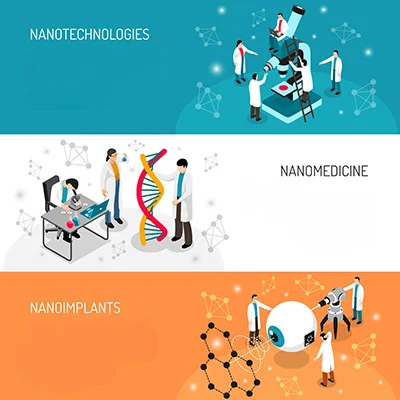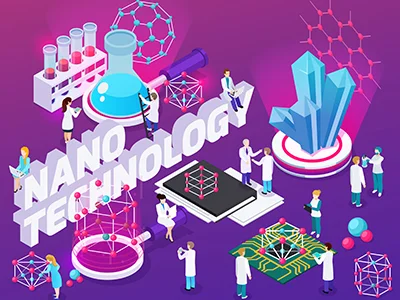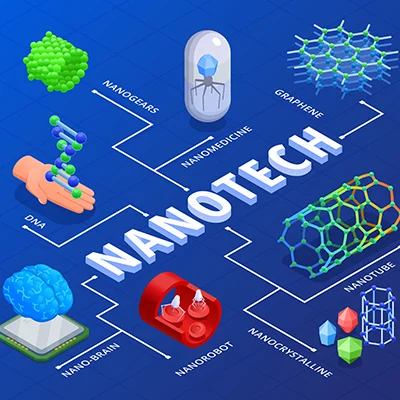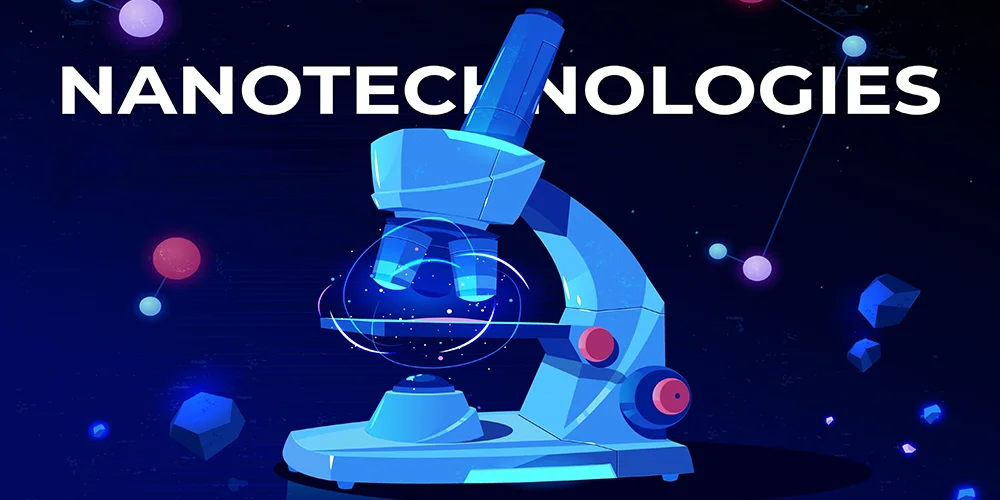Nanotechnology: The Future of Science and Engineering is a multidisciplinary field of science, engineering, and technology that focuses on manipulating matter at the nanoscale, which typically involves structures and phenomena on the scale of nanometers (one billionth of a meter). The prefix “nano” refers to this incredibly small size.
Types of Nanotechnology
Nanotechnology encompasses a wide range of techniques, approaches, and applications.
Here are some common types or categories of nanotechnology:
- Nanomaterials: This category includes the design, synthesis, and application of various nanoscale materials with unique properties. Examples include nanoparticles, nanocomposites, nanotubes, and nanowires. These materials find applications in electronics, medicine, coatings, and more.
- Nanoelectronics: Nanoelectronics involves the development of electronic components and devices at the nanoscale. It includes technologies like quantum dots, nanowire transistors, and molecular electronics, which aim to make electronic devices smaller, faster, and more energy-efficient.
- Nanomedicine: Nanotechnology plays a significant role in medicine and healthcare, particularly in drug delivery, diagnostics, and imaging. Nanoparticles and nanoscale devices can be used to target specific cells or tissues, improving the precision and efficacy of medical treatments.
- Nanofabrication: Nanofabrication techniques are used to create nanoscale structures and patterns on surfaces. These methods are essential for manufacturing nanoscale devices and integrated circuits.
- Nanotechnology in Energy: Nanotechnology is applied to improve energy storage, conversion, and efficiency. For instance, nanomaterials are used in advanced battery technologies, solar cells, and fuel cells.
- Nanotechnology in Materials Science: Nanotechnology contributes to the development of novel materials with improved properties, such as strength, conductivity, and thermal stability. Carbon nanotubes, graphene, and nanocomposites are examples of such materials.
- Nanotechnology in Environmental Science: Nanotechnology can address environmental challenges by developing nanoscale sensors for pollution detection, nanomaterials for water purification, and sustainable nanomaterial-based technologies.
- Nanorobotics: Nanorobots are tiny machines or devices designed to perform specific tasks at the nanoscale. They have potential applications in medicine for targeted drug delivery and in manufacturing for precision assembly.
- Nanophotonics: Nanophotonics deals with the interaction between light and nanoscale structures. It is used to develop ultra-compact optical components, photonic circuits, and advanced imaging techniques.
- Nanotribology: Nanotribology focuses on studying and controlling friction and wear at the nanoscale. It has applications in improving the durability and performance of various mechanical systems.
- Nanoeconomics and Ethical Implications: Understanding the economic and ethical aspects of nanotechnology is crucial. This includes assessing the economic impact of nanotechnology industries and addressing ethical concerns related to safety, privacy, and environmental impact.
These are just a few examples of the diverse areas within nanotechnology. Nanotechnology continues to evolve and expand, with new discoveries and applications emerging regularly. Researchers in these fields work towards harnessing the unique properties of nanoscale materials and structures to develop innovative solutions in various industries and scientific domains.

Features of Nanotechnology
Nanotechnology exhibits several key features and characteristics that make it a unique and promising field of science and technology:
- Nanoscale Manipulation: Nanotechnology involves the deliberate manipulation and control of matter at the nanoscale, typically at dimensions less than 100 nanometers. This precision allows for the creation of materials and structures with unique properties.
- Enhanced Properties: At the nanoscale, materials often exhibit enhanced or novel properties compared to their bulk counterparts. For example, nanoparticles may have increased strength, electrical conductivity, or reactivity.
- Interdisciplinary Nature: Nanotechnology is highly interdisciplinary, drawing from various scientific and engineering disciplines, including physics, chemistry, biology, materials science, and engineering. Collaboration across these fields is essential for its advancement.
- Applications Across Industries: Nanotechnology has applications in a wide range of industries, including electronics, medicine, energy, materials science, environmental science, and more. It has the potential to revolutionize these industries by creating new materials and technologies.
- Precision and Control: Nanotechnology enables precise control over the design and assembly of nanoscale structures. This level of control allows for tailoring materials and devices to specific applications.
- Miniaturization: Nanotechnology contributes to miniaturization in various fields, allowing for the development of smaller and more efficient electronic components, sensors, and medical devices.
- Drug Delivery and Targeting: In medicine, nanotechnology plays a crucial role in drug delivery and targeting. Nanoparticles can be designed to deliver drugs directly to diseased cells, reducing side effects and improving treatment efficacy.
- Environmental Applications: Nanotechnology offers solutions for environmental challenges, such as water purification, pollution detection, and renewable energy technologies.
- Nanoelectronics: Nanoscale electronic components and devices, including transistors and memory storage, enable faster and more energy-efficient electronics.
- Nanomaterials: Nanotechnology has led to the development of advanced nanomaterials like carbon nanotubes, graphene, and quantum dots, which have a wide range of applications.
- Nanorobotics: The field of nanorobotics explores the development of tiny machines and devices at the nanoscale. These nanorobots can potentially perform precise tasks within the body for medical purposes.
- Ethical and Safety Considerations: Nanotechnology raises important ethical and safety concerns, including potential environmental impacts, toxicity of nanomaterials, and privacy issues related to advanced surveillance technologies.
- Ongoing Research and Discovery: Nanotechnology is a rapidly evolving field with ongoing research, discoveries, and innovations. New applications and breakthroughs continue to emerge.
- Commercialization Potential: Many nanotechnology innovations have commercialization potential, leading to the growth of nanotechnology-based industries and startups.
- Long-Term Potential: Some futurists and scientists envision nanotechnology as a key driver in the development of advanced technologies like molecular manufacturing, which could have transformative impacts on various aspects of society.
These features collectively make nanotechnology a fascinating and promising field with a wide range of applications and the potential to address complex challenges across various industries. However, responsible development and ethical considerations are essential to maximize its benefits while minimizing potential risks.

Benefits of Nanotechnology
Nanotechnology offers a wide range of potential benefits across various industries and scientific domains.
Here are some of the key benefits of nanotechnology:
- Improved Materials: Nanotechnology enables the design and creation of materials with enhanced properties, such as increased strength, conductivity, and thermal stability. These advanced materials find applications in aerospace, automotive, construction, and more.
- Miniaturization: Nanotechnology allows for the miniaturization of electronic components, leading to smaller and more efficient devices. This is crucial for the development of smaller, faster, and more energy-efficient electronics.
- Drug Delivery and Targeting: Nanoparticles can be designed to deliver drugs precisely to targeted cells or tissues in the body. This enhances drug efficacy while minimizing side effects.
- Medical Diagnostics: Nanoscale sensors and imaging agents enable more accurate and sensitive medical diagnostics, aiding in early disease detection and monitoring.
- Cancer Treatment: Nanotechnology-based therapies, such as nanoparticle-based drug delivery and hyperthermia treatment, offer promising approaches for cancer treatment.
- Energy Efficiency: Nanotechnology contributes to improving energy efficiency in various ways, such as by developing advanced battery materials, efficient lighting, and energy-efficient coatings.
- Renewable Energy: Nanotechnology plays a role in enhancing the efficiency of solar cells and fuel cells, contributing to the development of sustainable energy solutions.
- Environmental Remediation: Nanotechnology can be used for pollution detection, water purification, and the removal of contaminants from the environment.
- Advanced Electronics: Nanoscale electronic components, such as nanowires and quantum dots, enable the development of faster and more powerful computing and communication devices.
- Water Filtration: Nanomaterial-based filters and membranes can effectively remove impurities and contaminants from water sources, providing access to clean drinking water.
- Improved Textiles: Nanotechnology coatings can enhance the properties of textiles, making them waterproof, stain-resistant, and even capable of conducting electricity for applications like wearable technology.
- Food and Agriculture: Nanotechnology is used in food packaging, ensuring longer shelf life, and in the development of agricultural nanopesticides and nanofertilizers for efficient crop management.
- Space Exploration: Nanotechnology has the potential to create lightweight and durable materials for space applications, as well as nanoscale sensors and instruments for spacecraft.
- Personal Care Products: Nanotechnology is used in cosmetics and personal care products for better product delivery and enhanced performance.
- Improved Water Desalination: Nanotechnology can contribute to more efficient and cost-effective desalination processes, addressing water scarcity issues.
- Advanced Manufacturing: Nanotechnology allows for precision manufacturing and the creation of nanoscale features in various industries, from semiconductor fabrication to aerospace manufacturing.
- Long-Term Potential: Some researchers believe that nanotechnology could eventually lead to molecular manufacturing, enabling the precise assembly of complex products at the molecular level.
While nanotechnology offers numerous benefits, it is essential to address ethical, safety, and environmental concerns associated with its development and deployment to ensure that these benefits are realized responsibly and sustainably.
How nanotechnology changed our life?
Nanotechnology has had a significant impact on various aspects of our lives, leading to improvements and innovations in numerous fields.
Here are some ways in which nanotechnology has changed our lives:
- Medicine and Healthcare:
– Drug Delivery: Nanotechnology has revolutionized drug delivery, allowing for more targeted and effective treatment with fewer side effects.
– Diagnostic Tools: Nanoscale sensors and imaging agents enable early disease detection and more accurate medical diagnoses.
– Cancer Treatment: Nanoparticles are used in cancer therapies, including targeted drug delivery and hyperthermia treatments.
– Regenerative Medicine: Nanotechnology contributes to tissue engineering and regenerative medicine by designing nanoscale scaffolds and materials for cell growth. - Electronics and Computing:
– Miniaturization: Nanotechnology has led to the miniaturization of electronic components, making devices smaller, faster, and more energy-efficient.
– Nanoelectronics: Development of nanoscale transistors, memory storage, and quantum dots has driven advances in electronics.
– Flexible Electronics: Nanomaterials enable flexible and wearable electronics with unique properties. - Energy and Environment:
– Solar Cells: Nanotechnology improves the efficiency of solar cells, making renewable energy more accessible.
– Battery Technology: Nanomaterials enhance battery capacity and charge/discharge rates, leading to longer-lasting and faster-charging batteries.
– Water Purification: Nanotechnology is used in water filtration and purification, addressing global water scarcity and pollution challenges. - Materials Science:
– Advanced Materials: Nanotechnology has introduced new materials like graphene, carbon nanotubes, and nanocomposites with superior properties.
– Coatings: Nanocoatings provide materials with enhanced durability, water repellency, and self-cleaning properties. - Consumer Products:
– Cosmetics: Nanotechnology is used in cosmetics for better product delivery, sunscreens, and anti-aging creams.
– Textiles: Nanotech coatings make textiles waterproof, stain-resistant, and even capable of conducting electricity for wearable technology. - Food and Agriculture:
– Food Packaging: Nanotechnology enhances food packaging materials, extending shelf life and reducing food waste.
– Agriculture: Nanopesticides and nanofertilizers improve crop yields while reducing environmental impacts. - Space Exploration:
– Nanotechnology contributes to the development of lightweight and durable materials for spacecraft and space exploration technologies. - Advanced Manufacturing:
– Precision nanofabrication techniques are used in industries like semiconductor manufacturing and aerospace. - Research and Development:
– Nanotechnology tools and instruments enable scientists to explore and manipulate matter at the nanoscale, leading to discoveries in various scientific disciplines.
Overall, nanotechnology has the potential to continue transforming our lives by enabling innovative solutions to complex problems and driving advancements in science, technology, and industry. However, it also raises ethical and safety considerations that require careful attention as the field continues to evolve.

What is the future of nanotechnology?
The future of nanotechnology holds immense promise and is likely to bring about transformative changes across various fields. While it’s challenging to predict with certainty,
Here are some potential directions and trends for the future of nanotechnology:
- Molecular Manufacturing: One of the most exciting possibilities is the development of molecular manufacturing, where nanoscale machines could assemble complex products at the molecular level. This could revolutionize manufacturing, enabling the creation of almost any material or product with unprecedented precision.
- Advanced Medicine: Nanotechnology will continue to play a pivotal role in medicine. Future advancements may include more effective cancer treatments, personalized medicine tailored to an individual’s genetic makeup, and the use of nanorobots for minimally invasive surgeries and targeted drug delivery.
- Electronics and Computing: As Moore’s Law approaches its limits, nanotechnology will be essential for sustaining the progress of electronics. This may involve the use of novel materials like graphene and quantum-dot-based technologies for faster and more energy-efficient devices.
- Energy Solutions: Nanotechnology will contribute to addressing energy challenges. Advances in nanoscale materials and energy storage technologies could lead to more efficient solar panels, longer-lasting batteries, and improved energy conservation methods.
- Environmental Applications: Nanotechnology will continue to be employed for environmental remediation and sustainable practices. This may include innovative water purification systems, efficient pollution detection sensors, and eco-friendly nanomaterial-based solutions.
- Advanced Materials: Researchers will likely discover and develop new nanomaterials with remarkable properties, expanding their applications across industries, from aerospace to construction.
- Space Exploration: Nanotechnology will be crucial for the development of lightweight and durable materials for spacecraft, advanced sensors for planetary exploration, and technologies for space colonization.
- Nanoelectronics and Quantum Computing: Progress in nanoelectronics could lead to the development of quantum computers and quantum communication technologies, enabling computational capabilities beyond what is currently possible.
- Ethics and Safety: As nanotechnology evolves, there will be an increased focus on ethical, safety, and regulatory considerations. Ensuring responsible development and addressing potential risks will be paramount.
- Nanotechnology Education: Education and training in nanotechnology will become more widespread as the field matures, preparing a new generation of scientists and engineers to harness its potential.
- Interdisciplinary Collaboration: Nanotechnology’s interdisciplinary nature will continue to drive collaboration among scientists, engineers, and researchers from various fields, leading to novel solutions to complex problems.
- Global Collaboration: International cooperation and standardization efforts will be crucial to establish common safety and ethical guidelines for nanotechnology research and applications.
Overall, the future of nanotechnology is likely to be marked by groundbreaking discoveries, disruptive innovations, and the continued integration of nanoscale science and engineering into everyday life. However, responsible development and ethical considerations will be essential to maximize the benefits while minimizing potential risks.
Internet of Things: (IoT) Benefits & Building The Urban Future
Cloud Computing: Definition, Types, Scope, & Benefits





